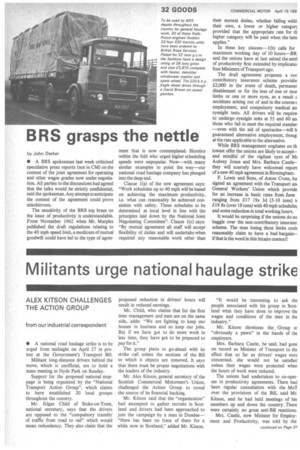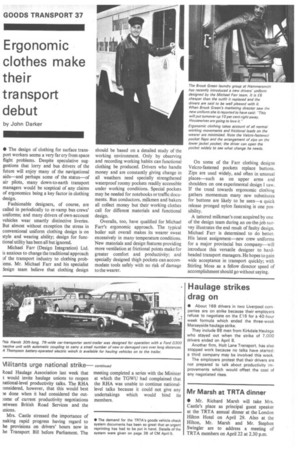Militants urge national haulage strike
Page 34

Page 39

If you've noticed an error in this article please click here to report it so we can fix it.
ALEX KITSON CHALLENGES THE ACTION GROUP
from our industrial correspondent
• A national "road haulage strike is to be urged from midnight on April 27 in protest at the Government's Transport Bill.
Militant long-distance drivers behind the move, which is unofficial, are to hold a mass meeting in Hyde Park on Sunday.
Support for the proposed national stoppage is being organized by the "National Transport Action Group", which claims to have established 20 local groups throughout the country.
Mr. Edgar Child of Stoke-on-Trent, national secretary, says that the drivers are opposed to the "compulsory transfer of traffic from road to rail" which would mean redundancy. They also claim that the proposed reduction in drivers' hours will result in reduced earnings.
Mr. Child, who claims that for the first time management and men are on the same side, adds: "We are fighting to keep our bosses in business and so keep our jobs. But if we have got to do more work in less time, they have got to be prepared to pay for it."
The group plans to go-ahead with its strike call unless the sections of the Bill to which it objects are removed. It says that there must be proper negotiations with the leaders of the industry.
Mr. Alex Kitson, general secretary of the Scottish Commercial Motormen's Union, challenged the Action Group to reveal the source of its financial backing.
Mr. Kitson said that the "organization" had attempted to gather recruits in Scotland and drivers had been approached to join the campaign by a man in Dundee— "there has been no trace of them for a while now in Scotland," added Mr. Kitson. "It would be interesting to ask the people associated with his group in Scotland what they have done to improve the wages and conditions of the men in the industry."
Mr. Kitson dismisses the _ Group "obviously a pawn" in the hands of tilt employers.
Mrs. Barbara Castle, he said, had gont on record as Minister of Transport to tht effect that so far as drivers' wages wen concerned, she would not be satisfied unless their wages were protected when the hours of work were reduced,
The unions had undertaken to co-operate in productivity agreements. There had been regular consultation with the MoT over the provisions of the Bill, said Mr. Kitson, and he had held meetings of his members up and down the country. There were certainly no great anti-Bill reactions.
Mrs. Castle, now Minister for Employment and Productivity, was told by the Road Haulage Association last week that t would invite haulage unions to reopen national-level productivity talks. The RHA :onsidered, however, that this would best x done when it had considered the out:came of current productivity negotiations )etween British Road Services and the mions.
Mrs. Castle stressed the importance of naking rapid progress having regard to he provisions on drivers' hours now in he Transport Bill before Parliament. The meeting completed a series with the Minister at which the TGWU had complained that the RHA was unable to continue nationallevel talks because it could not give any undertakings which would bind its members.








































































































































